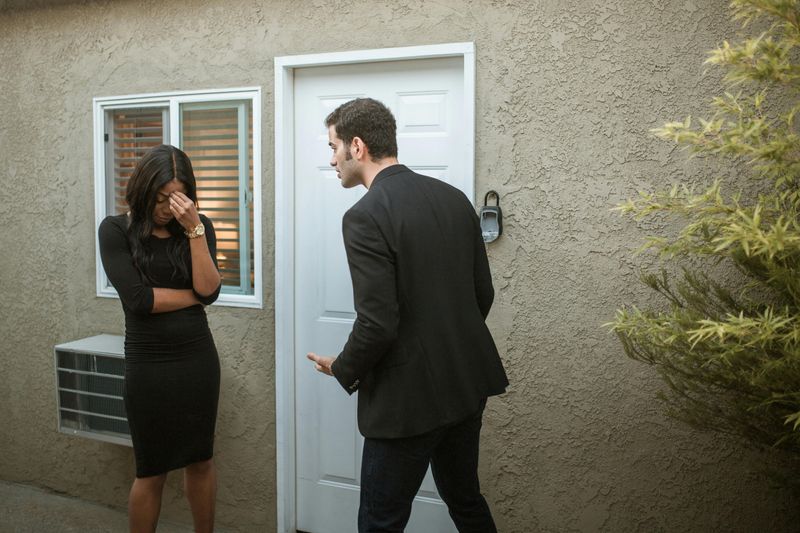12 Emotional Triggers That Can Hurt Your Relationship

Every couple faces moments when something small suddenly turns into a big argument. Often, these explosions happen because of emotional triggers—sensitive spots from our past that make us react strongly without thinking. Understanding what sets you or your partner off can help you both communicate better and avoid unnecessary fights. Learning to recognize and manage these triggers is one of the most important skills for keeping your relationship healthy and happy.
1. Feeling Ignored or Dismissed

When your partner scrolls through their phone while you’re talking, it stings more than you might expect. That feeling comes from a deep need to be heard and valued by the person you love most. Nobody wants to feel like their thoughts and feelings don’t matter.
This trigger often stems from childhood experiences where your voice wasn’t heard. Maybe your parents were too busy or distracted when you needed attention. Now, when your partner seems uninterested, those old wounds reopen.
The solution involves honest conversation about attention and presence. Set aside phone-free time together where you both focus completely on each other without distractions.
2. Criticism About Personal Habits

Constant comments about how you load the dishwasher or fold laundry can feel like attacks on who you are as a person. What starts as a simple suggestion quickly becomes a pattern that chips away at your confidence. These repeated criticisms make you feel like you’re never good enough.
People who grew up with overly critical parents often find this trigger especially painful. Your brain connects current criticism with past feelings of inadequacy and shame. The emotional response becomes much bigger than the actual issue.
Instead of criticizing, try expressing preferences kindly. Say what you need without making your partner feel wrong or incompetent about their approach.
3. Being Compared to Others

Hearing your partner mention how their friend’s spouse does something better immediately puts you on the defensive. Comparisons make you feel like you’re in constant competition that you’re already losing. Your brain interprets these statements as proof that you’re not enough.
This trigger connects to our fundamental fear of being replaced or abandoned. When someone compares you unfavorably to others, it threatens your sense of security in the relationship. You start wondering if your partner wishes they were with someone else instead.
Healthy relationships celebrate what makes each person unique. Focus on appreciating your partner’s individual strengths rather than measuring them against impossible standards.
4. Bringing Up Past Mistakes

Nothing kills a conversation faster than hearing about something you messed up months or years ago. When your partner digs up old mistakes during new arguments, it feels unfair and exhausting. You thought those issues were resolved, but apparently they’re still being held against you.
This pattern prevents relationships from moving forward because trust can’t grow in soil full of resentment. People who experience this trigger often shut down emotionally to protect themselves. They stop being open because vulnerability only leads to having their mistakes thrown back at them.
Forgiveness means actually letting go of past hurts. If something still bothers you, address it directly rather than stockpiling ammunition for future fights.
5. Lack of Appreciation

You cook dinner, clean the house, and handle countless small tasks that keep life running smoothly. Yet somehow your efforts seem invisible, like they’re just expected rather than valued. Over time, this lack of recognition builds resentment that poisons even the strongest relationships.
Everyone needs to feel seen and appreciated for their contributions. When thanks never comes, you start questioning whether your partner even notices or cares about what you do. This trigger makes people feel taken for granted and unimportant.
Expressing gratitude regularly keeps relationships strong and healthy. A simple thank you or acknowledgment can prevent this trigger from causing serious damage to your connection.
6. Broken Promises and Reliability Issues

When your partner says they’ll do something and then doesn’t follow through, trust starts cracking. Maybe they promised to be home for dinner or said they’d handle an important task. Whatever the specifics, unfulfilled promises send a message that their word doesn’t mean much.
Reliability forms the foundation of trust in relationships. People who experienced abandonment or inconsistency growing up find this trigger especially devastating. Each broken promise reinforces old beliefs that people can’t be counted on.
If you commit to something, honor that commitment or communicate early if plans change. Building reliability takes time but breaking it happens instantly with each unkept promise.
7. Defensive Behavior and Blame-Shifting

Trying to discuss a problem becomes impossible when your partner immediately gets defensive. Instead of listening, they redirect the conversation to make everything your fault. This blame-shifting prevents any real resolution because the actual issue never gets addressed.
Defensiveness creates a wall that blocks honest communication and emotional intimacy. When someone refuses to take any responsibility, their partner feels unheard and invalidated. The relationship stays stuck in the same destructive patterns because growth requires acknowledging mistakes.
Learning to receive feedback without automatically defending yourself transforms relationship dynamics. Take a breath, listen fully, and consider whether there’s truth in what your partner is saying before responding.
8. Withholding Affection or Silent Treatment

Silence and withdrawal of affection from a partner as a form of punishment can feel like being emotionally abandoned. The silent treatment weaponizes love, triggering feelings of anxiety and desperation in the person excluded. Such manipulation breaks down trust and encourages toxic patterns in the relationship.
Humans are wired for connection, so being deliberately excluded by someone you love triggers deep psychological pain. Research shows that social rejection activates the same brain regions as physical pain. This trigger works because it exploits our fundamental need for belonging.
Healthy conflict resolution requires staying engaged even when you’re upset. If you need space, communicate that clearly rather than disappearing without explanation or using silence to punish.
9. Tone of Voice and Attitude

Sometimes the words your partner says sound fine, but their tone tells a completely different story. A sarcastic edge or dismissive sigh can hurt more than outright yelling. Your body picks up on these subtle signals and responds with stress hormones before your brain even processes what’s happening.
Tone carries emotional weight that words alone cannot convey. When someone speaks to you with contempt or condescension, it communicates disrespect on a primal level. This trigger works so powerfully because tone bypasses our logical thinking and hits us emotionally.
Pay attention to how you sound, not just what you say. Practice speaking with kindness even during disagreements to maintain emotional safety.
10. Jealousy and Possessive Behavior

There’s a fine line between concern and control, and when questions pile up like walls, that line gets lost. Jealousy masquerades as care, building invisible bars that limit freedom and breed insecurity instead of love.
When your partner doesn’t trust you without reason, it creates a no-win situation. You feel guilty even when you’ve done nothing wrong. This trigger damages relationships because it’s impossible to prove a negative or earn trust from someone determined to be suspicious.
Trust must be given freely in healthy relationships, not earned through constant surveillance. Address your insecurities directly rather than trying to control your partner’s every move and interaction.
11. Invalidating Feelings and Experiences

Being told you’re overreacting or too sensitive when you express hurt makes you question your own reality. This invalidation sends the message that your feelings are wrong or don’t matter. Over time, you learn to suppress emotions rather than risk being dismissed again.
Emotional validation is crucial for intimacy and connection in relationships. When someone consistently tells you that your feelings aren’t legitimate, it’s a form of gaslighting that erodes your self-trust. You start doubting your own perceptions and experiences.
All feelings are valid even if you disagree with the interpretation. Listen to your partner’s emotions with empathy rather than immediately judging whether their response seems reasonable to you.
12. Financial Control and Secrecy

Money fights rank among the top causes of relationship stress and divorce. When one partner controls all financial decisions or hides spending, it creates power imbalances and destroys trust. Financial secrecy makes the other person feel like a child rather than an equal partner.
This trigger hits especially hard because money represents security and autonomy in our society. Being kept in the dark about finances or having to ask permission for basic purchases feels demeaning. It signals that one person’s judgment is valued more than the other’s.
Healthy couples discuss financial goals openly and make major money decisions together. Transparency about spending and shared responsibility prevent this trigger from undermining your relationship foundation.

Comments
Loading…